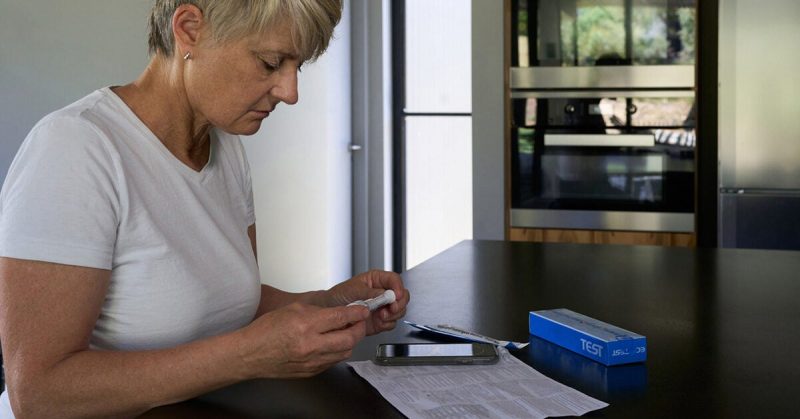Am I In Menopause? At-Home Perimenopause Tests

Are you curious about where you stand on your menopausal journey? Are you wondering if it’s causing those pesky symptoms, or is it something else? You can use a hormone testing kit to gain valuable insight from the comfort of your home.
As your body shifts hormone production during perimenopause — the prelude to menopause — you may experience hot flashes, mood swings, night sweats, and other physical changes. It’s like a rollercoaster of emotions and sensations inviting you to step into your true power and embrace your older, wiser self.
But how do you keep tabs on these hormonal changes? One solution is at-home menopause testing. These user-friendly kits offer valuable insights into your hormone levels, giving you a clear picture of where you stand on your menopausal journey. They’re simple, convenient, and oh-so empowering!
So, get ready to evaluate perimenopause and navigate this transformation like the boss you are!
A menopause home test is like having a hormonal detective at your fingertips! It’s a user-friendly and convenient kit that allows you to check your hormone levels right from the comfort of your home — or wherever else you choose.
These tests are designed to provide insights into your perimenopausal status by measuring key hormones like follicle-stimulating hormone (FSH) and estrogen using urine or saliva samples. FSH is responsible for egg maturation and ovulation and tends to increase as menopause approaches. On the other hand, estrogen, the superstar hormone responsible for a wide array of bodily functions, fluctuates during perimenopause.
Clear instructions guide you through collecting your sample, ensuring accurate results. Once your sample reaches the lab, their expert scientists work their magic, meticulously analyzing your hormones to provide a comprehensive hormonal snapshot.
And let’s not forget the excitement of unveiling your results! Typically, you’ll access your personalized hormonal profile through a secure online portal. Companies often provide follow-up guidance and advice as part of the service.
At-home tests offer the ultimate convenience, saving you a trip to the doctor’s office or clinic. You can perform the test in the privacy and comfort of your own home. No appointment is needed! Plus, compared to in-person testing, these kits are often more budget-conscious, making them a wallet-friendly option.
Another positive is that most at-home tests provide rapid results, allowing you to gain insights into your hormonal status without waiting weeks.
But, at-home tests may not be as precise as in-person tests performed by healthcare professionals. And as they focus on specific hormones, you’ll have a snapshot rather than a comprehensive evaluation of your hormonal profile.
Conversely, in-person testing is often more thorough, offering a deeper understanding of your hormonal status. And as a healthcare provider administers these tests, they can interpret the results within the context of your overall health and medical history.
However, opting for in-person menopause tests may come with some trade-offs. They might require scheduling an appointment, which means leaving the comfort of your home and could involve spending more money compared to their at-home counterparts. For example, at-home menopause test kits range from under $25 to around $100, depending on complexity, while in-person testing can cost anywhere from $200 to $300 or more.
So, which one to choose? It all boils down to your preferences, needs, and desired information level. For a quick and budget-friendly snapshot, at-home tests are a great option. Conversely, in-person tests with healthcare professionals are worth considering for a more comprehensive evaluation and expert guidance. Ultimately, it’s about empowering yourself with knowledge, whether from the comfort of your couch or the warmth of a doctor’s office.
When choosing the best at-home menopause test kit, you want to make sure you’re picking the one that suits your needs like a glove. Here’s a handy checklist of factors to consider before hitting that “add to cart” button.
- Price. First things first, check the price tag! At-home menopause test kits can vary in cost, so it’s essential to find one that fits your budget without compromising quality.
- Hormones measured. Look for a kit that covers the hormonal bases you’re interested in. Some tests may focus solely on FSH and estrogen, while others might include additional hormones like progesterone or luteinizing hormone (LH). Find the one that provides the insights you crave.
- Urine vs. blood. Decide whether you’re more comfortable with a urine or blood test. Urine tests are often less invasive and simpler, while blood tests may offer more comprehensive results.
- Ease of use. Let’s keep it hassle-free, shall we? Opt for a kit with clear instructions and an easy-to-follow collection process. You want to spend less time fumbling with the test and more time embracing your menopausal glow-up.
- Accuracy and reliability. Look for kits with a proven track record of accuracy and reliability. User reviews and product ratings can be a great way to gauge the kit’s performance.
- Turnaround time. Check the expected turnaround time for receiving your results. Some kits offer rapid results within a few days, while others may take a bit longer.
- Customer support. A little support goes a long way! Look for kits that offer reliable customer support if you have any questions or concerns.
- Privacy and security. Your personal data is precious, so ensure your chosen kit guarantees privacy and security when accessing your results online.
- Additional resources. Some kits may include bonus resources, like educational materials or access to health experts. These can be valuable extras.
- FDA approval or certification. Check if the kit has FDA approval or other relevant certifications to ensure it meets high-quality standards. However, most kits are not FDA-approved as it considers them wellness tests.
Knowing when to seek professional advice during perimenopause is essential for caring for your fabulous self. So, here are some signs that it’s time to give your doctor a call:
- Unusual symptoms. If you’re experiencing symptoms that are causing you concern or seem out of the ordinary, it’s time to reach out to your healthcare provider. From irregular periods to severe hot flashes and vaginal dryness, your doctor can help pinpoint the cause and provide guidance.
- Extreme discomfort. Perimenopause might come with some discomfort, but if you’re facing extreme pain that disrupts your daily life, it’s definitely time to schedule a doctor’s appointment. They can assess your symptoms and recommend appropriate treatments or interventions.
- Unexpected bleeding. While your periods may become irregular during perimenopause, your doctor should check out any unexpected bleeding or spotting. It’s essential to rule out any other potential causes and ensure your overall health.
- Concerns about fertility. If you’re contemplating pregnancy or have concerns about your fertility status during perimenopause, a visit to your healthcare provider is a must. They can provide insights into your hormonal status and fertility potential.
- Medical history. Certain medical conditions or medications can interact with hormonal changes, so it’s crucial to discuss menopause and perimenopause with your doctor.
- Questions and concerns. Remember, there’s no such thing as a silly question! If you have any questions or concerns about menopause or perimenopause, your doctor is there to lend a listening ear and provide answers.
If you’re experiencing anything out of the ordinary or simply want to gain a deeper understanding of your menopausal status, it’s time to pick up that phone and make that appointment.
Here’s an overview of some different home-testing options:
EverlyWell Perimenopause Test
This is a comprehensive but reasonably priced ($99) test with great reviews. A finger-prick blood sample is required to measure FSH, estradiol, and LH. Everlywell works with CLIA-certified labs, meaning they’re strictly regulated, have state and federal certifications, and undergo regular inspections.
EverlyWell Postmenopause Test
Designed for those looking for info on hormone levels now they’re in menopause. It tests estradiol and progesterone levels with saliva sample collection. Oh, and it costs $99 and is HSA/FSA eligible.
LetsGetChecked Female Hormone Test
At just under $130, this test is on the pricier side, but it’s comprehensive. It tests FSH, LH, prolactin, and estradiol, helping you understand your fertility status and identify hormonal imbalances. Your sample is processed in a CLIA-Certified lab, so you can be confident in the quality of the results, which you’ll receive in a few days.
Do at-home menopause tests work?
These tests can offer accurate results when used correctly and following the kit’s instructions. According to the FDA, these tests accurately detect FSH 9 in 10 times.
But, they are qualitative tests, meaning they show whether or not your FSH levels are raised, not if you definitely are in menopause or perimenopause. Remember that as you age, FSH levels may naturally rise and fall during your menstrual cycle.
The North American Menopause Society states that saliva tests are inaccurate, and bear in mind that FSH tests may not work if you’re taking hormonal contraception.
How much are at-home menopause tests?
The cost of at-home menopause tests can vary depending on the brand, the number of hormones measured, and additional features the kit may offer. On average, these tests can range from $20 to $100.
While some kits might be more budget-friendly, others may have a higher price tag, reflecting their comprehensive hormonal analysis. So, shop around and find the one that suits your needs and your wallet!
What’s the difference between perimenopause and menopause?
Perimenopause is the transitional period leading up to menopause. It’s like the pre-party before the grand finale. During perimenopause, hormone levels fluctuate, causing typical menopause symptoms, like the infamous hot flashes.
Menopause, on the other hand, marks the grand finale of your menstrual cycles, waving farewell to periods for good. It’s official when you’ve gone 12 consecutive months without menstruation.
How to use at-home menopause test
First things first, ensure your test kit is ready to roll with all components included. Make sure you’re choosing an appropriate time to take the test based on your menstrual cycle (if you still have one). For those without regular periods, you can usually take the test anytime.
Before diving in, take a moment to read the instructions carefully. Each kit may have specific guidelines, and it’s essential to follow them to get accurate results.
Depending on the test type, you’ll collect a urine or saliva sample. Follow the instructions on collecting your sample correctly, which usually involves placing a few drops of your sample on a test strip or into a container.
Ensure you follow specific guidelines, such as not eating or drinking for a certain period before collecting your saliva sample.
Then you’ll return your samples to the lab in the pre-paid envelope and play the waiting game before your results are uploaded to the portal.
Menopause is the permanent end of menstruation, while perimenopause is the period leading up to menopause. It’s accompanied by hormonal changes and the symptoms you usually associate with menopause.
At-home menopause tests provide insights into your hormone levels but can’t tell you definitively if you’re in menopause or perimenopause.
If you’re concerned about menopause symptoms, check in with your healthcare provider. They can help you manage them and rule out any underlying issues.








